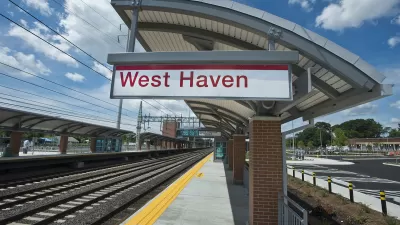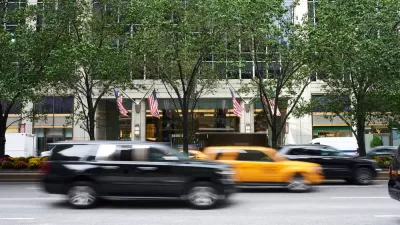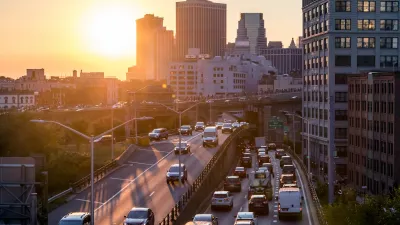The debate about ending the gas tax to fund transit capital projects has arrived in New York City, where the MTA is beset by a $12 billion shortfall. Although an increase in sales tax has its supporters, Stephen Miller and Move NY support tolling.
"The MTA capital program is facing a $12 billion shortfall, according to Comptroller Thomas DiNapoli, and unless that gap is closed, transit riders will end up paying even more to cover the agency’s ballooning debt load," reports Stephen Miller before making the case for tolling as the less regressive option for the MTA to make up its deficit.
While former Transportation Secretary Ray LaHood has suggested that New York adopt Virginia's model of transportation funding by increasing its sales tax. Miller shares the following data to rebuke that proposal: "But a sales tax is one of the most regressive revenue-raisers out there. Of the types of taxes states typically levy — on property, income, and sales — “sales and excise taxes are the most regressive, with poor families paying eight times more of their income in these taxes than wealthy families, and middle income families paying five times more,” according to the non-partisan Institute on Taxation and Economic Policy [PDF]."
Instead, Miller supports the funding model proposed by Move NY to toll drives entering Manhattan below 60th Street. Miller argues in favor of Move NY's plan: "Car owners are wealthier than car-free New Yorkers, and a Move NY analysis shows that drivers who will pay more under the plan have household incomes far higher than transit users. Asking them to pay a higher toll to support train and bus service, while lowering tolls in the outer boroughs, transfers resources from the haves to the have-nots — it isn’t regressive at all."
The article includes more details about differences between tolling and sales tax schemes.
FULL STORY: Unlike Toll Reform, a Sales Tax Really Is a Regressive Way to Fund Transit

Planetizen Federal Action Tracker
A weekly monitor of how Trump’s orders and actions are impacting planners and planning in America.

Maui's Vacation Rental Debate Turns Ugly
Verbal attacks, misinformation campaigns and fistfights plague a high-stakes debate to convert thousands of vacation rentals into long-term housing.

San Francisco Suspends Traffic Calming Amidst Record Deaths
Citing “a challenging fiscal landscape,” the city will cease the program on the heels of 42 traffic deaths, including 24 pedestrians.

Defunct Pittsburgh Power Plant to Become Residential Tower
A decommissioned steam heat plant will be redeveloped into almost 100 affordable housing units.

Trump Prompts Restructuring of Transportation Research Board in “Unprecedented Overreach”
The TRB has eliminated more than half of its committees including those focused on climate, equity, and cities.

Amtrak Rolls Out New Orleans to Alabama “Mardi Gras” Train
The new service will operate morning and evening departures between Mobile and New Orleans.
Urban Design for Planners 1: Software Tools
This six-course series explores essential urban design concepts using open source software and equips planners with the tools they need to participate fully in the urban design process.
Planning for Universal Design
Learn the tools for implementing Universal Design in planning regulations.
Heyer Gruel & Associates PA
JM Goldson LLC
Custer County Colorado
City of Camden Redevelopment Agency
City of Astoria
Transportation Research & Education Center (TREC) at Portland State University
Jefferson Parish Government
Camden Redevelopment Agency
City of Claremont





























